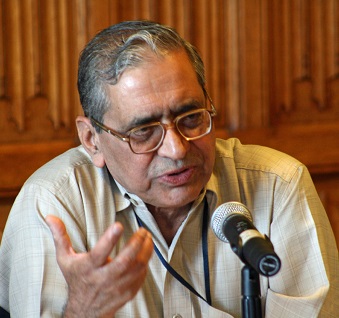
In his own estimate, Prof. Kapil Kapoor has been teaching for over sixty years. He is something of a legend not only among his numerous students, but also among students of Indian Knowledge Systems, of which he has been one of the pioneers in India. Generations of them have been fascinated by his lucid, invigorating and ever original expositions, as a speaker and a writer alike, of the most abstruse concepts of Indian literature, philosophy, aesthetics, languages and textual studies. Above all, he has been an unmatched champion of India’s intellectual traditions.
Prof. Kapil Kapoor has a long list of accomplishments: he taught at Jawaharlal Nehru University, New Delhi, for many years, as Professor of English (in the Centre for Linguistics and English) and as Concurrent Professor at JNU’s Special Centre for Sanskrit Studies (now School of Sanskrit and Indic Studies). He was also Dean of the School of Language, Literature and Culture Studies (1996-1999) and JNU’s Rector (Pro-Vice-Chancellor, 1999-2002). He was a member of numerous bodies, among them the Indian Council of Philosophical Research, the Central University of Higher Tibetan Studies, Sarnath, and the Sanchi University of Buddhist and Indic Studies, Madhya Pradesh. He chaired the important MHRD Language Expert Committee for Comprehensive Language Policy for India, whose report is under consideration. He steered the pioneering CBSE elective course for classes XI and XII, “Knowledge Traditions and Practices of India” (KTPI). Currently, he is Chairman of the Indian Institute of Advanced Study, Shimla.
Prof. Kapil Kapoor has a considerable body of works to his credit, including Language, Literature and Linguistics: The Indian Perspective (1994), South Asian Love Poetry (1994), Canonical Texts of Literary Criticism (1995), Literary Theory: Indian Conceptual Framework (1998), Text and Interpretation: The Indian Tradition (2005), Dimensions of Panini Grammar: Indian Grammatical System (2005), Rati-Bhakti in India’s Narrative Traditions (in Hindi, 2011), Comparative Literary Theory: An Overview (2014) and Abhinavagupta Manuscripts (forthcoming). He also edited Indian Knowledge Systems (2 vols, 2002), an 11-Volume Encyclopaedia of Hinduism (2012), and an Encyclopaedia of Indian Poetics (under publication).
Two lectures (in conversation with Michel Danino): “Panorama of India’s Knowledge Traditions” and “Pan-Indianness of India’s Intellectual Traditions”.
These two sessions, in the format of a free-wheeling conversation, will explore the complexity, richness and creativity of India’s knowledge traditions: their continuous and cumulative nature, the areas of knowledge they explored, some of their high accomplishments, their spread and growth over the centuries, and how its protagonists dialogued among themselves across time and space. Highlights of some of the tallest Indian intellectuals, from Panini to Abhinavagupta and beyond, will provide a sense of the pan-Indianness of those traditions and their contribution to the weaving together of a vibrant cultural entity from Kashmir to Kanyakumari and from Gujarat to Bengal and Assam.
Reading
Kapil Kapoor, “Indian Knowledge Systems: Nature, Philosophy and Character” in Indian Knowledge Systems, Kapil Kapoor & Avadhesh Kumar Singh (eds), DK Printworld, New Delhi, 2002